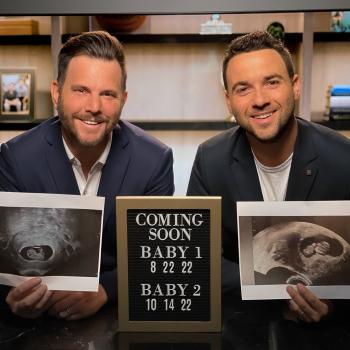In an interview with Jonathan Merritt, Eugene Peterson openly expressed that if he were still pastoring, he would have no qualms performing a same-sex wedding ceremony for a “…gay couple in [his] church who were Christians of good faith.” The veritable “who’s who” of gay-affirming “Christians” have exploded with affirmation and enthusiasm over the apparent switch of biblical ethics on the issue of marriage by Eugene Peterson. Rachel Held Evans, in her classic style, quickly moved to question whether or not the patriarchy would condemn Patterson as quickly as they did Jen Hatmaker. Patheos’ own Progressive Channel writer, Benjamin Corey, also expressed similar thoughts, sans the RHE reference to the patriarchy.
Other conservative authors, such as Russell Moore have also weighed in, asking if we Should Still Read Eugene Peterson. Or, like Preston Sprinkle, some are essentially yawning and shrugging away the statement from Eugene Peterson on Same-Sex Marriage. While much of what Moore writes is excellent, his closing thoughts that Eugene Peterson is a wise, gentle Christian is highly problematic. The same can be said of Sprinkle’s treatment – in that much of what he writes is solid content and biblically faithful, yet the implication seems to be that Peterson can perform a same-sex wedding ceremony and not be clear upon his stance of the issue itself. It would seem no other voices affirming gay-marriage have any confusion over Peterson’s seal of approval.
Yet the more problematic point in both of these pieces is that in some scope, there is still the pass Peterson gets, as if he can maintain these problematic views and still be a functioning, God-honoring Christ follower. This notion is absolutely foreign to the Scriptures and a dangerous assumption to make for one maintaining a biblical ethic, let alone a biblical, sexual ethic. Why? We are dealing with matter of primacy, in that no man is free to cavalierly dismiss the flagrant nature of sin or the very real danger of apostasy. Apostasy is a thing which no man may come back from.
When we are dealing with issues such as these, we must be willing to ask the appropriate questions and then land firmly in the appropriate conclusions, making clear that embracing certain theological arguments can necessarily disqualify one from the faith. Secondly, an attitude of hand-waving towards others who hold such positions does not engender a proper reflection on the reality of the situation. There is a proper lament Christians should have when sin is winked at.
“Sin is the dare of God’s justice, the rape of His mercy, the jeer of His patience, the slight of His power, and the contempt of His love.” John Bunyan
At this point we aren’t truly discussing if the unrepentant one heralding same sex unions and claiming Christ is holding to a legitimate form of Christianity anymore. There is no such beast as the “Progressive Christian” known in the Scriptures. You can call it nearly everything you like – save Christianity. It is, by all standards of biblical and rational thought – a different religion altogether. There is no middle ground; there is no murky water; there is no forgiveness for flagrant, defiant, rebellion.
Affirmation of homosexuality, no matter how many qualifiers, subtleties, and anecdotal evidences are brought to the discussion, denies the possibility of legitimate faith for the unrepentant. Likewise, the Scriptures are equally clear upon the one who remains unrepentant in affirming sin. They do not worship the God revealed in the Scriptures. They do not know the Christ whom was sent by the Father for the forgiveness of sins. They have not experienced the indwelling and illumination of the Spirit who testifies of this Christ. They may have appeared to take root in the soil, yet the soil proved rocky; the cares and concerns of this age caused the seedling to die.
The hard truth of the matter is that those in positions of influence advocating for God’s acceptance of homosexuality, are man-pleasers. What a pitiably poor prize to reap with the loss of one’s soul. The equally hard truth is that those who heap up such teachers and praise them in their infidelity to the truth, are seeking to have their ears tickled. Though professing to have a love of the Father, there is no love of Him found within them, for they do not love His commands.
Part of the issue is found in this very concept: obedience to God’s commands genuinely displays a love of God. It is not that the Christian obeys in order to be saved. Rather, it is that a genuine Christian will obey because they are saved; Christians not only have a vested moral interest in obedience to the commands of Scripture – they have a desire to do so. It pleases them to please the Father, just as it shames them to bring the Father shame by making a mockery of the spilt blood of the risen Savior.
Within this one finds the particular function of and restrictions upon sexual intimacy – a topic the Scriptures deal with in great profundity. Rather than spend time focusing on several instances, the key text we will look at is 1 Cor. 6:15-20.
The overarching point of vv. 15-17 is not marriage itself, but living in a holy union with the Lord. In this though, the context is immediately applicable within the sexual nature of a marriage, which is evidenced as the only context where such relations are not only permissible, but also encouraged in the following chapter. In this then, we see these verses not as a condemnation of the sexual act itself, but the joining of the covenant community, which is consecrated, with those who are not part of that covenant community, by way of sexual deviancy. The context specifically indicates that one’s individual body does not belong to them, but the Lord – and given the plain indication that practitioners of such things will not inherit the Kingdom of God, there is little question why Paul ties in the event of the resurrection here.
The usage of Genesis 2:24 embedded in Paul’s argument falls within the framework of the creation narrative, meaning that the argument at hand bears a timeless quality and draws a specific distinction between the sexual union in marriage and that of sexual union with the prostitute. The idea being fairly clear: the person is taking that which has been consecrated and grafted into the body of Christ and ripping it from that context, and joining it with that which is set for destruction. To put it more bluntly, the sexually immoral one is joining their own body, which is conjoined to the body of Christ (and to Christ Himself), in defilement of these unions by having sex outside of the confines of biblical marriage. To be sure, homosexuality is not the only means by which one can defile their union with Christ and His body – but the stark picture here serves to illustrate that sex truly is an act of worship, consecrated by God.
Sex is inherently worth much more than the pleasure derived from it and intrinsically linked between one man and one woman and their union with Christ. It conveys a depth of meaning tied to the inseparable bond of biblical marriage and the mystery of this union in relation to the salvation afforded to the redeemed. Thus, any expression outside of that sacred bond is not only against the creation ordinance, but betrays the unity one has with God in one spirit. In other words, this offense is not a private sin at all; it adds a corporate dimension to the nature of sexual sin because the offender naturally affects those whom he is joined together with in that body.
In this, Paul suggests quite clearly that due to the singular body (the individual) belonging to the Lord and that these constituent parts are summarily of the whole body (the church) – this is not left to the realm of a metaphysical dualism of person-hood, in a separation of the physical and spiritual dimensions. It also annihilates the idea of the individual person being removed from the corporate gathering of God’s people (the church). The collective body, that is, those who are believers, are joined with one another and with the Lord; therefore, their practice in sexual immorality brings us back to the overarching reason for abstention: the collective body of believers is the temple of the Lord and entering into this form of dualism ushers forth a perspective of singular autonomy – making a mockery of the crucifixion, the forthcoming resurrection of believers, and the unity of the church in the bond of the Spirit.
The lie this generation wishes to package up with a neatly tied bow is that the individual who does not express themselves sexually is somehow less of a person. If this were not the case, sexuality itself would not be defined as an identity. Yet one finds a wide and ever-growing swath of expressions in their sexual identity, all of which lend credibility to the idea of one’s personhood being confirmed in these sexual expressions. In a manner that defies all cultural expectations, self-proclaimed rights, and definitions of identity, Christ claims dominion.
The fullest and only true expression of identity is found within the person of Christ and the collective body of believers He has brought together in His gospel. Anything less than this not only deviates from the rich heritage of the historic church, but fundamentally denies Christ’s Lordship over every single aspect of our lives. The reality of the matter at hand is that being blood-bought children of God requires such children to put to death the deeds of the flesh. Now, the deeds of the flesh are obvious, as Paul already mentions in 1 Cor. 6:9-11, yet the idea is that any who are sexually immoral can find forgiveness and justification through Christ. They can be cleansed and set apart for His purposes so that they may glorify God in their bodies, and bring honor to those whom they are joined in fellowship with.
In the end, the expressions of Eugene Peterson, if they prove unrepentant, and whomever else will inevitably follow won’t make an iota of difference on that Last Day. They will not shake the foundations of the church; they will not revoke the applicability and authority of the Scriptures; they will not leave the Lord in shambles as they apostatize and demonstrate whom their father truly is. They went out from us because they were never of us. At some point we must be willing to look upon someone and rightly deduce if they have become apostate.
Update: Apparently, Eugene Peterson has retracted his earlier “yes” to being willing to perform a same-sex marriage, though this doesn’t seem to give any more clarity to an actual repudiation of homosexuality:
In his retraction, the 84-year-old said that in nearly three decades as a pastor and the years since, “I’ve never performed a same-sex wedding. I’ve never been asked and, frankly, I hope I never am asked.”
“This reporter, however, asked a hypothetical question: if I were pastoring today and if a gay couple were Christians of good faith and if they asked me to perform their wedding ceremony—if, if, if. Pastors don’t have the luxury of indulging in hypotheticals,” said Peterson. “And to be honest, no is not a word I typically use.”
Peterson went on to say that because of the biblical view of marriage, he would not marry a same-sex couple:
When put on the spot by this particular interviewer, I said yes in the moment. But on further reflection and prayer, I would like to retract that. That’s not something I would do out of respect to the congregation, the larger church body, and the historic biblical Christian view and teaching on marriage. That said, I would still love such a couple as their pastor. They’d be welcome at my table, along with everybody else.
What does “welcome at my table” mean? The Lord’s Supper? The dinner table? If the latter, of course; if the former, that’s no retraction at all. His other quote referencing the grace of God still does not indicate in a decisive manner whether God requires actual obedience to abstain from being a practicing homosexual. Truthfully, the statement is so open that it doesn’t indicate if any professing Christian should abide in obedience.













